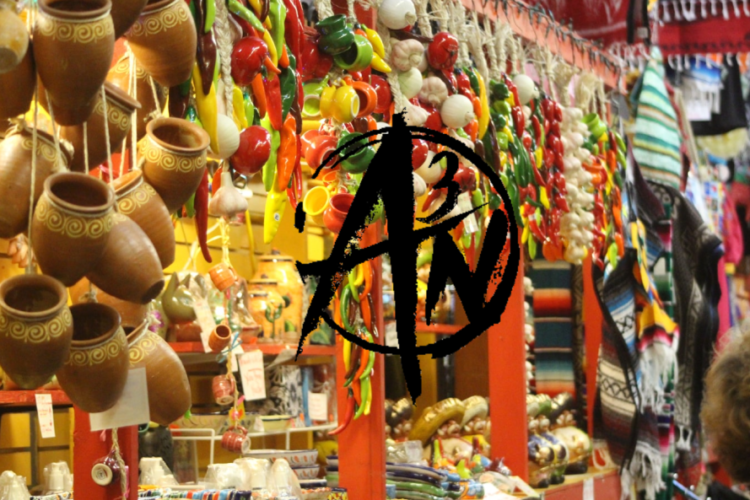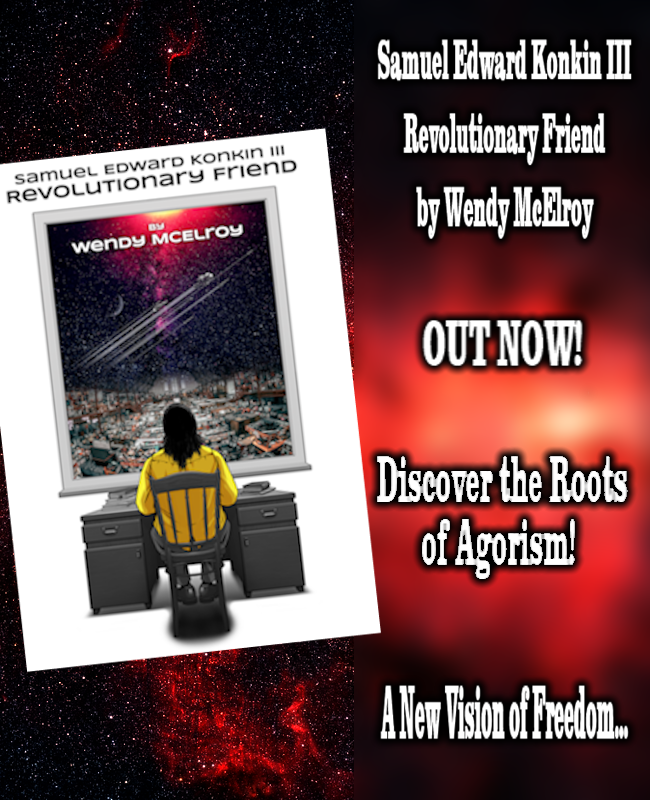
Birth Of An Agorist
Agorism has been a part of my life for as long as I can remember, although I didn’t have a name for it for most of my life. My parents have always just called it “getting by.” My agorist nature comes from the influence of my parents and how they chose to make money during my youth.
My first memory of what I now know as agorism is about five years old. My Mom was big in the hippie music fest scene of the 90s and by the time I was five, she had me trained to tie hemp jewelry and sell it at her shows. Nearby her best friend would sell her world-famous chili, in a marketplace sea of vendors all selling their skills in order to fund their party habit. My Mom was also selling drugs during this time, although we weren’t involved in that as kids other than being around her when she did these things.
When I was done selling things, often my Mom would give me small amounts of money in exchange, which I’d use to go buy things from the other vendors. For as long as I can remember, I’ve loved marketplaces.
When my Mom wasn’t at music festivals, she was growing and selling plants. My earliest memories of this were of her running her Mom’s above-ground business in a greenhouse, but that eventually went out of business. My Mom, who loved growing everything (mostly houseplants), kept her own project going which she sold any way she could, usually at flea markets. Where most kids had a playground, my Mom’s backyard was filled with rows and rows of plants she was growing to sell.
Every week during the summer she’d pack up her small blue school bus to the brim with plants with barely enough room for us kids. We’d head to the local flea market where she’d spend the day selling. Sometimes we would help if she was particularly busy, other times we’d wander the flea market looking at what the other vendors had to sell.
Most of my childhood, my Dad was doing what he called “under the table” auto body work. He’d restore old cars for friends, fix their fender benders (tax free, outside the shop), and paint cars in his garage basically doing what he could to get by. He occasionally held “regular” jobs, working in a taxed auto body shop, but most of my life involved him getting by with his shade tree auto body jobs.
It was always very apparent to me that my parents were both artists, just different kinds, who were doing their best to get by and survive while doing what they loved. Both often talked of avoiding taxes and regulations, planting seeds in my young mind although I highly doubt either of them knew what effect they were having on me.
All the while they kept up their agorist tasks, my parents told me not to be like them. They wanted me to go to college, get a good normal job, and make good money. So, for most of my life during school, especially from the ages of 11-18, I did what they suggested. But I felt stifled and full of anxiety at my future ahead, which seemed unclear at best. My interests were wide, and I felt the crushing anxiety of “having to choose something” at a very young age.
At 18, I went to college and started trying to specialize in one thing as recommended. What I found was I had an incredibly hard time choosing what to specialize in; the whole idea of it made me nervous. I thought I was broken, having too many interests not able to pick one. Then I met the man most know as John Galton.
He introduced me formally to the ideas of libertarianism. At the time, I worked at the library and had special grad student privileges that allowed me to check out as many books as I wanted. I started scouring the shelves for anything free market related and eventually came across agorism. I can’t cite the book that I found that term in the first time, but I do remember feeling relief as I finally understood what I wanted to do. The trouble was, it wasn’t going to be in college.
It took about six months from when I determined that I wanted to pursue agorism exclusively to when I quit college. In that time, I dabbled a little in entrepreneurship by reviving my skills for tying hemp jewelry. I had just started glassblowing classes from a local pipe maker and was producing pendants which I used in the jewelry. I sold most of what I made to friends and local pipe shops, but it was a start, enough to get me excited about my future.
It was also in this time that I started getting involved in the cannabis market, which was obviously illegal where I was at the time. I loved the thrill of offering a good product to those who wanted it but was painfully aware of the possible consequences of my actions. None of this pushed me off of my drive for agorism, it just made me more creative and determined to live that lifestyle.
Then, sometime in late 2012, I learned about Bitcoin. I came home from class to an enthusiastic John Galton who was talking about an anonymous peer-to-peer digital currency. Within just a few months of that, I dropped out of college all together and dropped into the agorist lifestyle. John bought his first coin at 9 dollars a coin using student loan money and started investing immediately. Before long, partially due to the game Satoshi Dice, he had 125 Bitcoin to play with. We discussed leaving the country, but instead decided to stay in the United States.
Over the next one and a half years we spent every bit of that bitcoin trying to survive living off grid while farming stolen government land. The food we grew was sold to anyone who would buy it and it was our first real all-in attempt at living this agorist lifestyle on our own terms. We also sold mulberry jam made from locally harvested berries, we produced and sold what we could. We ended up with lessons learned from that, and that was basically it.
The agorism really got going when we moved to Detroit. We did our off grid living first in the hood of Cleveland, only to have it end by being robbed of our solar panels. We ended up with family for a few months before finally getting to Detroit, where the community of Fireweed Universe City was thriving. There was a split mindset in the community which still somehow managed to work, one half was somewhat socialist, the other was agorist.
While in Detroit, we thrived on the agorist lifestyle, working under the table cash gigs with a local working co-op while also trimming weed for a friend who was growing it just off the famous 8-Mile. The exchange of goods and services in that community was incredible and unlike anything we’d ever experienced before.
In the process of moving the rest of our things to Michigan, we got arrested in Ohio and charged with five felonies, just because of the cannabis-related stuff we had in our car. While we loved the life we were building in Detroit, it no longer seemed feasible with the looming charges over our heads so we made a plan to move south across the international border into Mexico.
Our plan was to survive solely off agorism. We started our adventure in Detroit during the fall cannabis harvest and eventually moving to Oregon before going south. What we found in Oregon was that agorists like ourselves were not valued nearly enough and we ended up doing a lot of work just to survive when the intent was to make money off the west coast weed boom to make it south to the border and eventually to Acapulco.
After a while of being somewhat smothered by socialist tendencies, we went for the border with basically nothing, begging for spare change handouts and small working gigs along the way. We only made it over the border with the help of a random BTC donation from someone in the Acapulco community and we made it to Acapulco itself on a loan from a close friend. That loan was later repaid from our agorist efforts in Mexico.
When we made it to Acapulco, we did what we had to hustle a living. We sold what little cannabis oil we had for donations and I started cooking for the community on a nearly nightly basis for money to support us. It was hard, but we were there doing what we loved — being agorists. The first year was a constant struggle and hustle but we survived, thanks to our friends who supported our efforts.
By the next Anarchapulco, we were getting to a point where we were truly in the flow of hustle. I was making and selling cannabis infused candies and we got everyone at Anarchapulco extremely stoned while filling our pockets with much needed cash. It was at this conference that the idea for Anarchaforko was truly born.
The next year was a whirlwind of hustling, blogging, and planning the first Anarchaforko. We got sponsored by SmartCash and actually made the damn thing happen despite all odds. In just two years we went from being broke and homeless in Mexico to throwing an international conference, all from our efforts in agorism.
By 2018 we were fairly successful thanks to our constant hustle and voluntary relationships with friends who supported us through the hard times. We worked our asses off constantly to the point where we’d lived in Acapulco for years but hadn’t really done much of the tourist stuff most people do when they get there. At the end of 2018, we were planning Anarchaforko 2.0 and still living the agorist dream, having weekly carnivore meat-ups at a friend’s restaurant.
That all came to a screeching halt in February 2019, when John Galton was murdered at our home after six months of threats from a psychotic ex-military American man. My best friend was shot, and he and I were both forced to go into hiding. In the days to come, I was robbed of everything I had worked for, including my dogs, cameras and computers. I went from constant agorist hustle to nothing, left to hide and wait to see how to best approach this situation.
I was extremely lost during that time. As someone who thrives on work, I was left with literally no responsibilities and in some ways, that was just as hard as dealing with the loss of life and property. I was supported for a time by donations which kept me alive and safe, but I was once again craving a return to my agorist lifestyle, one in which I could support myself.
As time went on, I managed to get myself back into the swing of things, starting with SmartCash, who was the Anarchaforko sponsor for 2019. They supported my decision to cancel Anarchaforko and again supported me by hiring me as part of the Outreach Hive One Team about a month or two after the murder.
In this time, I built highlyfunctionalgrowth.com in an attempt to kickstart my agorist lifestyle. I missed sharing my adventures and wanted to use it as a platform for fundraising, selling my wares and even to get myself hired for jobs. The next several months were a blur of survival and getting new gigs to support myself.
Fast forward to now late 2019, and I’m finally happy and at a point where I am fully supporting myself again. There were times where I thought I wouldn’t make it, but my hard work is finally starting to pay off. In this time, I’ve picked up new skills, the most recent being podcast audio engineer for now two podcasts.
You would think the hardship I have faced would have scared me off of an agorist lifestyle, but in fact the opposite occurred. I’m more dedicated than I’ve ever been because especially with my unique legal situation, it’s how I survive here in Mexico. Beyond that, the incredible amount of happiness that comes from only putting effort into things I care about makes everything, even the losses, worth it.
I remember working regular jobs before this lifestyle and how soul-sucking they were. Being forced to be somewhere at a specific time and stay all day doing the same thing over and over. Now my life is flexible, open to change. You’d think without the restrictive schedule I’d get less done, but in reality, I get more done than ever because I’m truly motivated to do my tasks I line up for myself.
I work from when I wake up to when I sleep again, but what I do is a hell of a lot more fun than what most people do. Sure, I’ve faced hardships, but I also wouldn’t trade my lifestyle for any other in the world.








